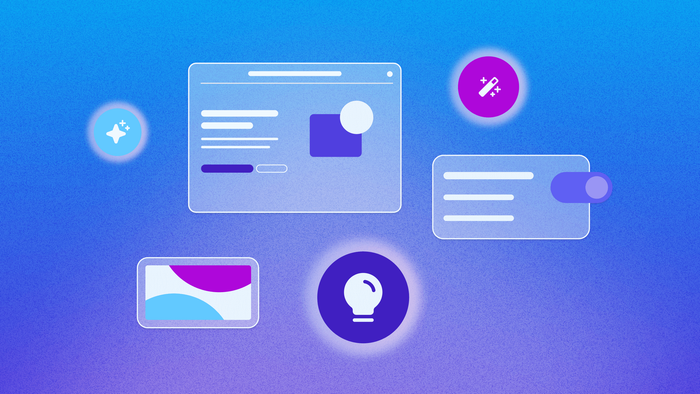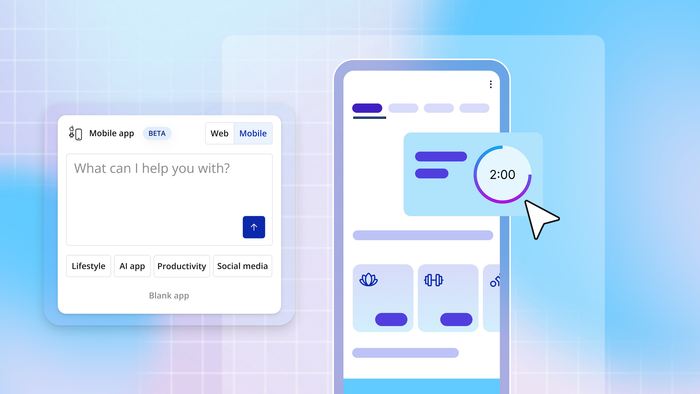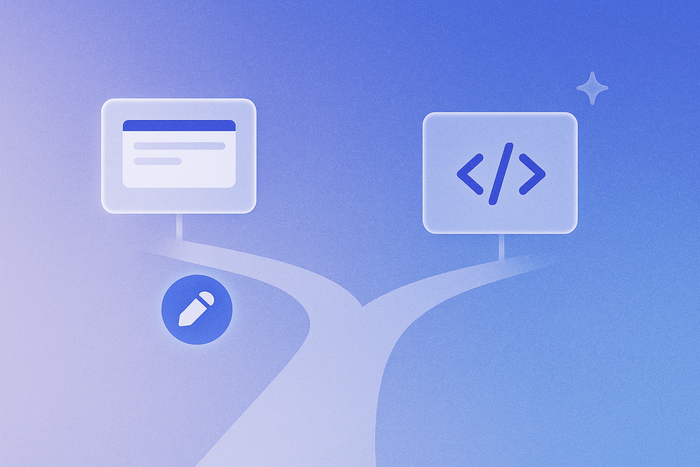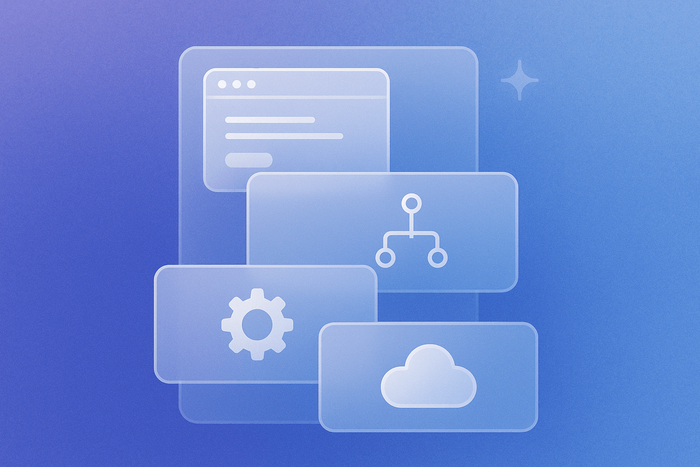Research any business today and you’ll see AI at work. Customer service chatbots handle the first wave of support tickets. Inventory systems predict when you’ll run out of stock. Marketing teams use AI to write email subject lines that actually get opened. The technology isn’t coming — it’s here, and it’s profitable.
This shift has created real opportunities for entrepreneurs who can spot problems worth solving: In fact, AI startups raised $110 billion last year alone, representing a 62% increase from the previous year.
Ready to get in on the action and build your own AI business? Check out our 11 most promising AI startup ideas you can launch today with Bubble — no coding required.
Why AI startups?
The momentum behind AI startups is undeniable. In 2024, there were 49 startups that raised funding rounds worth $100 million, and seven companies raised rounds of $1 billion or more. Plus, top incubators like Y Combinator have continued to request and invest heavily in AI startups like CoCounsel and Checkr — and support innovative problem-solvers over founders with deep technical expertise.
Even more impressive is revenue. The top 100 AI companies by revenue have achieved $5 million in annualized revenue in just 24 months, compared to 37 months for the top 100 SaaS companies in 2018.
Here’s what this means: Customers want AI solutions, investors are funding them, and companies are growing faster than we’ve ever seen.
But what really makes this era of business-building different is how accessible it has become. When you build on Bubble, you don’t have to be an expert in artificial intelligence to create an AI-enabled app: Bubble’s AI app generation capabilities and visual development tools mean you can bring AI to your app even if you don’t know any code.
10+ exciting AI app startup ideas to consider
Want to launch an AI startup but don’t know where to begin? Check out these 11 promising AI business ideas — all buildable on Bubble.
Think of these as inspiration rather than blueprints to copy: Each idea represents a problem space where AI can add real value, helping you identify which market opportunities align with your own experience and interests.
1. AI-powered mental health app
About 33% of Americans are actively focusing on mental health this year, but traditional therapy requires scheduled appointments that don’t fit everyone’s life. What if there was a way to offer people even more support?
This app idea would allow users to journal through text or voice. Then, AI would analyze sentiment, track mood patterns, and suggest personalized coping strategies. It’s an app that wouldn’t replace therapy, but rather fill in the gaps between sessions with consistent, accessible support.
Why this idea makes sense in 2025: Behavioral health services are expanding from $87.8 billion in 2024 to a projected $132.5 billion by 2032, but access remains pretty limited. An AI-powered app built with Bubble’s ChatGPT integration could help augment professional mental health care by delivering personalized, 24/7 support that’s both affordable and accessible to users wherever they are.
2. AI financial advisor for sustainable investing
Sustainable investing is crucial, but doing it accurately and efficiently is hard.
This AI app would prompt a user with a few questions about their values (Climate change? Fair labor? Board diversity?), and in turn, produce a personalized investment portfolio by scanning thousands of companies’ ESG (Environmental, social, and governance) scores. The app could also predict performance and even automatically rebalance as scores change.
Why this idea makes sense in 2025: More than three-quarters of investors globally want to put money behind companies with positive social impact, but researching ESG criteria is time-consuming and confusing.
3. AI legal assistant
Building a business and affording top-notch legal counsel don’t always go hand-in-hand. The solution? An app that provides affordable legal support for startups through AI-powered document generation, risk analysis, and plain-English explanations of complex legal terms.
Within the app, users could create customized NDAs, contracts, and agreements via simple prompts, while an integrated chatbot handles legal FAQs and compliance alerts.
Why this idea makes sense in 2025: The average attorney charges $257 per hour, pricing out startups and small businesses that need basic legal documents and compliance help.
Dyspute.ai is one example of an AI startup tackling this issue: The Bubble-built AI mediation app drafts demand letters, facilitates conflict resolution, and handles complex legal tasks that would otherwise require expensive attorneys.
4. AI education platform for neurodivergent learners
This app idea is all about individualized learning — it would create personalized educational experiences for students with ADHD, autism, dyslexia, and other learning differences by adapting to each student’s unique learning style.
The app would identify whether a student learns better through visual, audio, or hands-on content, then adapt lessons in real time. When attention drops, it switches activities. Plus, it would give parents and teachers clear insights into learning patterns and progress.
Why this idea makes sense in 2025: 15–20% of the population is neurodivergent, but most educational platforms use one-size-fits-all approaches that don’t work for ADHD, autism, or dyslexia.
5. AI video production assistant
What if small businesses could create professional marketing videos just by describing their message and target audience? Imagine an AI tool that handles everything from scriptwriting to selecting visuals, making high-quality video content accessible without expensive equipment or technical skills.
Users could describe their message and target audience. Then, the app would write scripts, generate voice-overs, select stock footage, and create platform-specific versions for Instagram, YouTube, and TikTok — all automatically.
Why this idea makes sense in 2025: 91% of businesses use video marketing but spend over $500 per video.
AI-powered platforms built on Bubble like Faceless.video are already proving this model works by fully automating video creation and posting across YouTube, TikTok, and Instagram — no human involvement required.
6. AI career development and upskilling platform
Navigating career changes can be hard. An AI-powered career coach app could make it much easier.
This AI-powered system could analyze job market trends and individual strengths to create personalized learning paths, portfolios, resumes, and cover letters. It could also facilitate practice interviews through real-time simulations with AI avatars.
Why this idea makes sense in 2025: 85 million jobs will disappear by 2025, while 97 million new roles will emerge. Traditional education can’t keep pace with evolving job requirements, creating demand for platforms that can quickly integrate new content, advice, and support.
Bubble-built platforms like Odyseek are already filling in the gaps — the AI tool optimizes resumes, matches candidates to job requirements, and simulates realistic interviews to help professionals navigate career transitions.
7. AI assistant for dietary restrictions
Food restrictions are increasingly common, but solutions remain basic.
An AI-powered app could change that by analyzing recipes, suggesting ingredient substitutions, creating personalized meal plans, and scanning product labels for safety. Plus, it could identify allergen-friendly restaurants based on individual needs and preferences.
Why this idea makes sense in 2025: 85 million Americans manage food allergies or intolerances, but most recipe platforms offer limited options instead of adapting existing ones.
8. AI-driven sustainability measurement platform
Sustainability is often a compliance headache. But an AI app could turn it into a competitive advantage.
This platform would automatically calculate emissions across operations, suggest energy optimizations, recommend low-carbon suppliers, and track regulatory compliance.
Why this idea makes sense in 2025: 71% of business leaders factor sustainability into investment decisions, and 80% see it as a revenue driver. But most companies struggle to measure and improve their environmental impact.
9. AI research analyst
Consultants and researchers don’t need more data; they need faster insights from the data they already have — and this AI tool could do just that.
In place of a personal research assistant, users could upload documents or paste URLs and get instant AI-generated summaries and argument comparisons. The app could also answer natural language questions about the content, cutting research time from hours to minutes.
Why this idea makes sense in 2025: The volume of available information has created a synthesis bottleneck. AI-powered analysis could cut through information overload quickly, helping users identify critical takeaways faster than ever.
Bubble-built platforms like Formula Bot have already proven this model, offering users actionable AI-powered qualitative and quantitative analysis right from their raw data.
10. AI interior designer
Imagine having an app that gives you instant shopping lists, DIY instructions, and visual designs of your space — all from a photo.
An AI-powered interior designer could use computer vision to analyze existing spaces, then generate style-based makeovers (Scandinavian, boho, modern, etc.). It could also offer chat-based design advice via natural language processing, cost estimates, and step-by-step renovation guidance to make professional interior design accessible to everyone.
Why this idea makes sense in 2025: Home renovation spending dropped from $481 billion to $450 billion due to rising costs, but people still want to improve their spaces. An AI platform that provides professional-level design advice would address the gap.
11. AI podcast content automation tool
Content repurposing has been a common strategy among creators and successful businesses, but what if it could be easier? An AI-based tool could do just that — helping podcasters handle post-production by transforming raw episodes into polished content packages.
Users could upload their recordings and instantly receive transcripts, episode summaries, optimized titles, show notes, and even social media posts tailored for different platforms.
Why this idea makes sense in 2025: With 500+ million podcasts competing for attention, creators need efficient ways to maximize their content across platforms. An AI tool could handle the routine work so creators could focus on content.
How to come up with the best AI startup ideas
The ideas above are great starting points, but here’s the truth: You’ll likely find more success building something that leverages your unique strengths, experience, and network than copying an idea from any online list — including this one.
While these 11 concepts show what’s possible, your winning idea will probably emerge from your own frustrations, industry knowledge, or connections that others don’t have.
So how do you identify those golden opportunities? Here are a few proven strategies for generating compelling AI startup ideas that are uniquely yours.
Follow the growth
The most lucrative AI business ideas often exist in rapidly expanding sectors. Industries experiencing growth are typically more receptive to new technologies and approaches.
To start, pick one industry that interests you. Within the industry, search for recent news, founder interviews, or investment trends, and consider questions like:
- What tasks appear time-consuming, error-prone, or frustrating?
- What information gaps exist?
- Where are current solutions falling short?
These pain points become your opportunity spaces.
Improve what already exists
Sometimes the best startup ideas aren’t completely novel. Rather, they’re thoughtful improvements on what already exists.
Look for “good enough” solutions that people use despite limitations by using sites like G2 or Capterra. Focus on a few tools and filter for low-star reviews. Then, look to see if reviews feature common complaints like:
- “Too much data entry” or “constant monitoring”
- “One-size-fits-all” or “doesn’t adapt to our needs”
- “Constant issues”
- “Too complicated” or “steep learning curve”
- “Poor integration”
All of these areas of frustration can potentially lend themselves to AI-based solutions.
Take Mailead founder Jeremy Redman: He bought a basic Bubble-built email outreach tool for $10,000, added AI capabilities to streamline lead outreach and pipeline tracking, and grew the platform into a $2 million business.
Focus on what you know
Your industry knowledge is a powerful edge when coming up with a profitable AI business idea.
Think about the roles, sectors, or problems you understand deeply — this insight helps you spot inefficiencies others miss. Founders who build from firsthand experience are more likely to find product-market fit, make smarter decisions, and move faster.
Ask yourself:
- What repetitive or frustrating tasks have I dealt with in past roles?
- Where did I wish smarter tools existed?
- What problems do I know inside and out that AI could solve better?
Bring your AI startup to life with Bubble
Launching an AI startup used to mean relying on technical co-founders or costly dev teams. Bubble changes that. Our AI-powered visual development platform lets you build sophisticated, scalable apps — visually and without writing code.
Design responsive interfaces, integrate advanced AI technology like ChatGPT or DALL-E, and even have AI help generate your app’s structure, all from a single platform built for both web and native mobile. With built-in scalability, security, and collaboration tools, Bubble gives you everything you need to go from idea to launch — and beyond.
Build for as long as you want on the Free plan. Only upgrade when you're ready to launch.
Join Bubble





